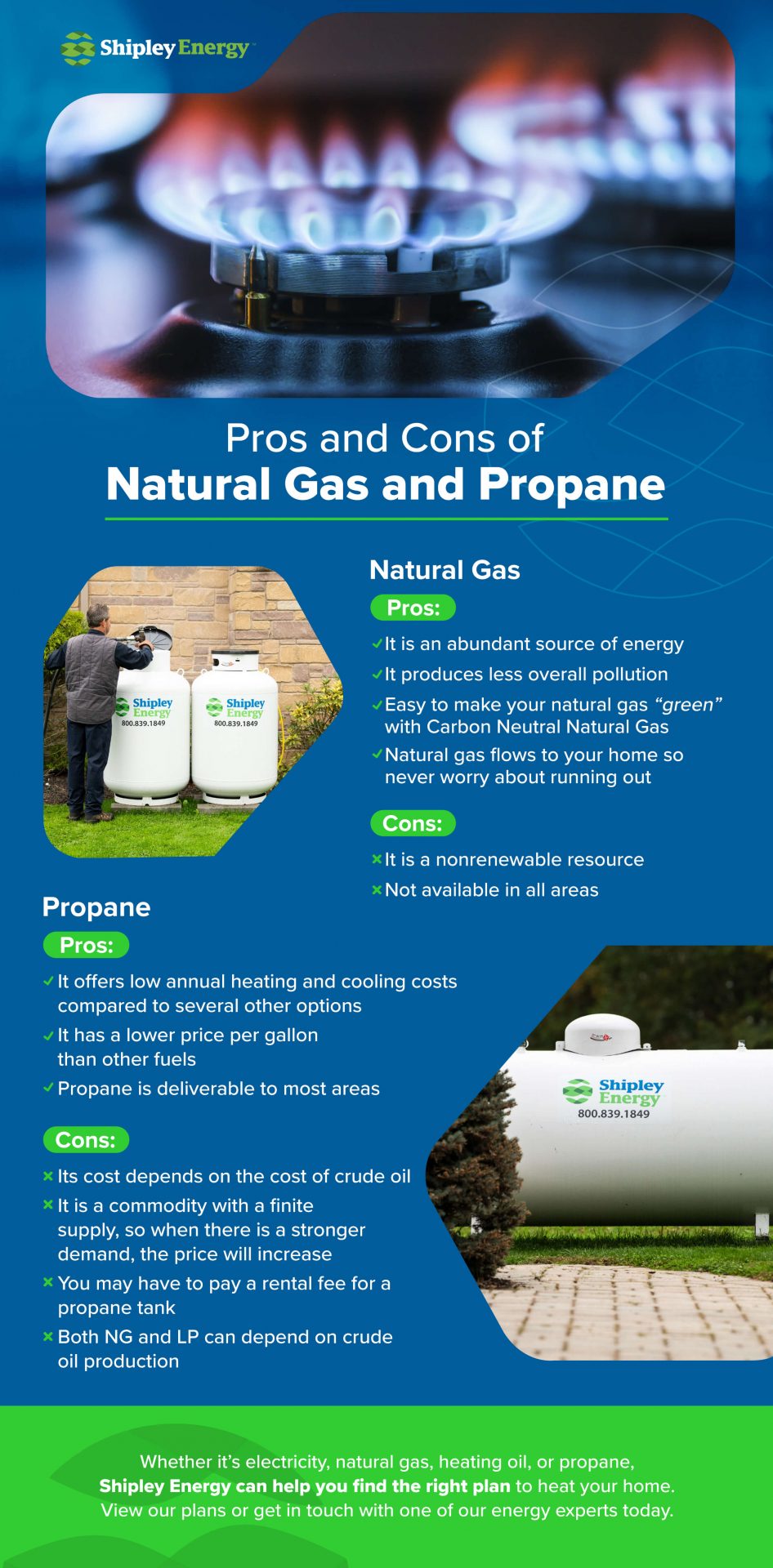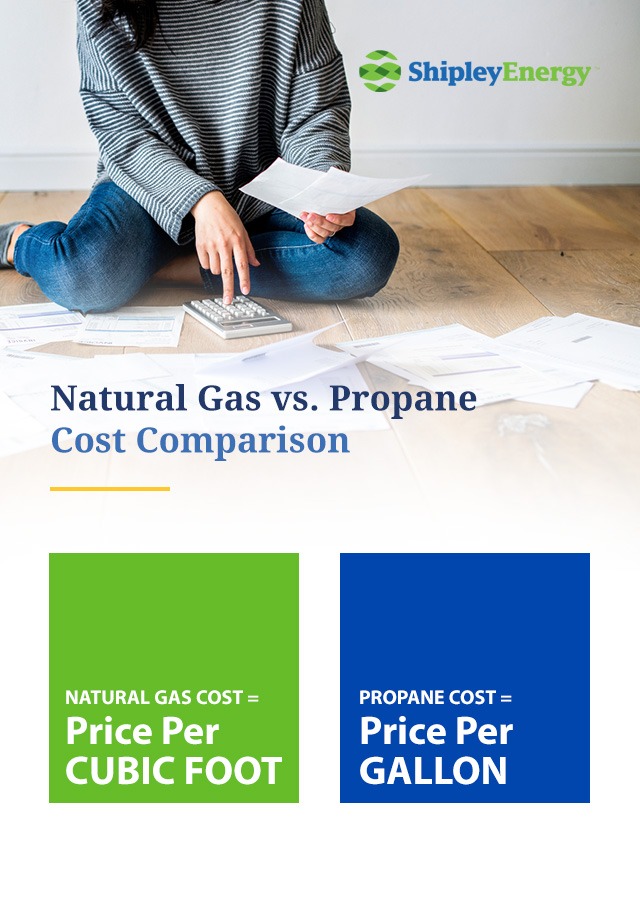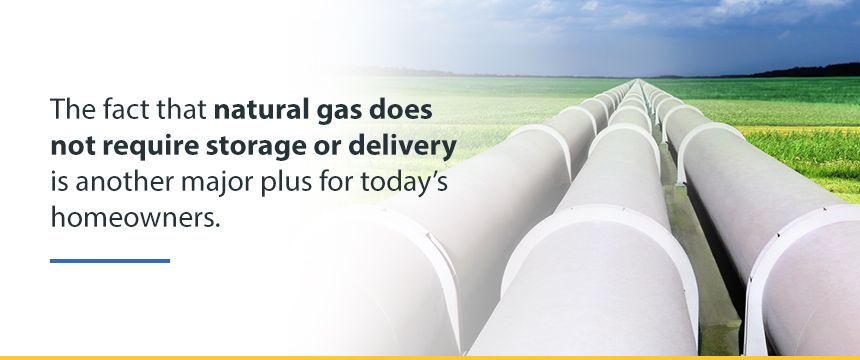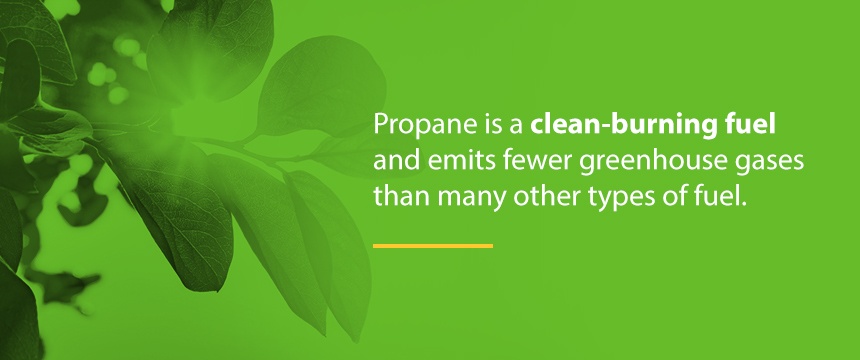

Natural gas and propane are two common heating fuels in homes across America, but which one is the right choice for you? Both of these fuel types have pros and cons that are, in some cases, determined by external factors. The following article digs deeper into the question of whether natural gas or propane is better for heating.
Natural gas is a fossil fuel that is transported to homes via underground pipelines. As a gaseous fuel, natural gas does not require home storage and is, therefore, one of the safest home-heating options. The majority of natural gas is produced domestically here in the United States.
Natural gas is a relatively clean-burning fuel that offers high efficiency for heating systems and household appliances. The market for natural gas has become more competitive in the U.S. since the advent of deregulation, which has opened the door for competing companies to provide natural gas at lower rates with terms that are more favorable to customers.
Propane is also a fossil fuel that is mostly produced here in the U.S. Unlike natural gas, however, propane is a liquid fuel. As such, propane is delivered to homeowners and kept in residential storage tanks. A propane tank can be stored indoors or outdoors. On some properties, the tank is stored underground. Homeowners with indoor tanks generally have it in the basement.
Because propane has to be delivered and stored, propane levels must be continuously monitored. As a propane user, you would need to make sure that your supply does not run too low before your next delivery. That said, many delivery companies now maintain systems that monitor when customers are due for their next deliveries.

For many homeowners who have the option to choose, the cost difference of natural gas and propane is the main determining factor in their ultimate decision. This raises the inevitable question — is propane or natural gas cheaper?
The cost issue is not a cut and dry matter with either of the two fuel types, as both are determined by measures and markets. With natural gas, rates are based on a price per cubic foot model. For propane, rates are based on a price per gallon model. In both cases, market stability or volatility impacts the price during a given period.

When the respective units of measure for natural gas and propane are converted for mutual comparison, it will sometimes seem as though natural gas is priced at lower rates. However, various factors can impact your monthly rates for either fuel type.
For starters, the climate in your region will impact how much fuel your household consumes during particular times of the year. If you live somewhere that gets exceptionally cold during the winter months, you will inevitably rely more on your heating system for warmth, regardless of whether you use propane or natural gas.
Your monthly fuel prices can also be a matter of household usage and product efficiency. Therefore, your bills could largely depend on the condition of your furnace or appliances. Rates can also hinge on the number of minutes or hours that you have these units active during a typical day. If any of your equipment has faulty internal mechanisms, the unit might strain itself just to perform basic functions. Consequently, the unit might consume larger quantities of fuel than would otherwise be the case with a more efficient furnace or oven.
One comparison that can help you determine the probable cost difference between propane and natural gas is to gauge and contrast the BTU, which is used to measure the heating efficiency of a particular fuel type. Propane, in general, rates higher on the BTU measure than natural gas. Therefore, even if propane is sold at higher rates than natural gas, the propane burns cleaner and generates more heat with less fuel consumption, thereby potentially giving you lower monthly rates.
Most of today’s homeowners care about their carbon footprint and how their decisions will impact the environment. If you are wondering whether natural gas or propane is more energy-efficient and clean-burning, consider the environmental advantages of these two fuels over the competing options. Simply put, both propane and natural gas are cleaner than some other options on the market.
Natural gas generates far fewer emissions than coal. This quality has made natural gas into a favored energy alternative among the environmentally conscious. By using natural gas, you can help reduce the levels of greenhouse gases in the air.
Propane fuel is known as a clean-burning fuel. If you use propane, your house will likely emit less carbon dioxide than neighboring homes that rely on conventional types of fuel. Overall, both propane and natural gas are environmentally friendly fuel options. Compared to coal, which produces between 214.3 and 228.6 pounds of CO2 per million BTU, propane produces only 139.0, and natural gas produces just 117.0.
Natural gas has grown in popularity among U.S. homeowners in recent years because it is a domestically produced and clean-burning fuel that is highly efficient and relatively easy on the environment. The popularity of natural gas has also been spurred on by the fact that the infrastructure for its distribution is already in place. The fact that natural gas does not require storage or delivery is another major plus for today’s homeowners.

In colder parts of the country where winters can be especially harsh, natural gas is perhaps the most convenient type of heating fuel because service interruptions rarely occur. Even if local power lines get knocked down, you will still have heat because the furnace is fed by underground pipelines that are safe from the storm. Since the supply of gas is constant and nonstop, there is no risk of running out of fuel at the worst possible times.
On the downside, natural gas produces greenhouse gases and has a high percentage of methane content. Natural gas is also a non-renewable fuel that will not be replaceable in the far-off future. The production of natural gas takes place at concentrated facilities and generally must travel many miles to reach an end-point destination. Consequently, the distribution of natural gas relies on a complex piping system that will get even larger as more communities sign on for the fuel.
Gas leaks are dangerous and can cause significant harm to members of your household if left unaddressed. While natural gas and propane manufacturers give their product an artificial smell similar to rotten eggs to alert property owners to leaks, scent alone isn’t a foolproof detection method. If the leak is relatively small or the person in the home has a compromised sense of smell, they may not be able to detect the leak until the amount of gas present has reached dangerously high levels.
Much like smoke and carbon monoxide detectors, natural gas detectors provide warning that a hazardous event is imminent before it occurs. Having a natural gas detector installed takes the guesswork out of determining if a leak is present, giving the occupants sufficient time to get to safety and call a professional to address the hazard.
Detectors are best installed near the gas source, such as a furnace or stove, and away from doors or windows to prevent air inflow from interfering with the accuracy of their readings. Since the gas is lighter than air, you’ll want to place your detectors approximately 6 inches from the ceiling. You also need to maintain them by testing them frequently and replacing their batteries as needed.
If you smell gas or your detector has alerted you of the presence of a gas leak, stop whatever you are doing. Don’t operate any appliances like a grill or a stove and avoid activities that could create a spark and ignite the gas, like switching a light on or off.
From there, you and any other family members present will need to evacuate the home, being sure to take any pets along with you. Then, call your local public utility or gas company and alert them to the leak so they can come deal with it safely.
In many respects, propane fuel is the best of both worlds because you can use it to heat and power your house virtually anywhere. With propane, the fuel is delivered to your address and stored in your on-site propane tank. As such, your home is not connected to any gas company when you use propane.
If service interruptions occur with the natural gas supplier, this won’t affect you because propane would come directly from your own indoor or outdoor tank. Therefore, you do not even need to live along the piping grid of a gas company when you rely on a propane tank. With propane, you can live far off the grid in a self-built home.
Another one of the main advantages of propane tanks is their portability. You can set up a propane tank virtually anywhere you wish to have it on your property. With natural gas lines, there are limitations to where connected units can be situated. With propane, you can place the tank anywhere indoors or outdoors. If you have an extended backyard with a long deck, you could set the tank up at the far end and make that your barbecue area.
Propane is a clean-burning fuel and emits fewer greenhouse gases than many other types of fuel. It is also one of the most efficient types of fuel on the market with an excellent BTU rating. Even if you have to make an initial investment in a propane tank and furnace, you may soon earn your money back through increased fuel efficiency and energy savings.

Granted, there are possible drawbacks to propane fuel. Despite its high efficiency, propane might not actually save you any money in the long run. Whether or not you do save depends on various factors beyond just your choice in fuel. Factors that could impact your monthly propane fuel rates include the size of your house, the number of appliances that rely on propane fuel, and the efficiency of these appliances.
Switching over to propane can also be a costly move, especially if you need to upgrade various appliances in the process. If your current appliances are old, outdated, or otherwise not suited for a propane setup, you could be looking at multiple three-figure investments at once just to make the switch. If you live on a tight budget and are doing fine with your current energy source, switching to propane might not be your wisest possible choice at present.
A propane tank can give you a sense of independence from the power grid and gas pipes, but you might need to watch your fuel levels. Depending on the rate of your fuel consumption, you could burn through a tank of propane before you even realize it. That said, some of today’s propane companies monitor their customers’ propane supplies for them.
Should you use natural gas or propane for your home? The answer depends on your needs as a homeowner.
If you use a lot of fuel to power your heating equipment and appliances during the colder months, propane and natural gas both have their advantages. With propane, you could get superior fuel efficiency, provided you have an efficient furnace. With natural gas, you would have a nonstop fuel supply with no need for deliveries.
Your choice between propane or natural gas could also depend on how you wish to have fuel delivered to your address. If you want to live independently of piping grids and have your fuel supply stored locally, propane could be your ideal solution. If you simply want an ongoing supply of fuel that flows into your house with no need for a storage tank or delivery schedule, natural gas would be the better option.
If you are concerned about running out of fuel, natural gas will take those apprehensions off the table. With natural gas, you never have to worry about your fuel supply running low when you need it most. If a snowstorm hits your area and blocks off traffic, you won’t have to worry about whether delivery trucks can reach you. On the other hand, if you would prefer to have a more personalized relationship with your fuel provider, the propane delivery driver will be at your address every time your tank needs a new supply.
As a propane user, you would probably develop a habit of monitoring your fuel level and knowing when it is time for a new supply. Even if you find yourself running low and needing a new delivery as soon as possible, you can still get help at odd hours as long as you live near a fuel company that offers 24/7 service.
As a homeowner, fuel is one of your most valuable resources, especially during the colder months when you rely most heavily on your heating system. When it comes to heating fuel options, natural gas and propane are two of the safest and most convenient, efficient, clean-burning and abundant options you could choose.
In Pennsylvania and Maryland, Shipley Energy is a trusted source for natural gas and propane fuel. Our representatives can help you decide which option is right for you and then ensure you get the fuel services you need. Contact Shipley Energy to learn more about our residential natural gas tank and propane services.